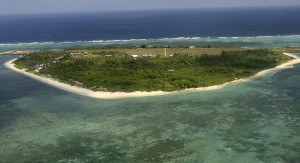
Pag-asa Island, part of the disputed Spratly group of islands, in the South China Sea located off the coast of western Philippines. AP FILE PHOTO
BRUSSELS, Belgium—The decision by a United Nations tribunal on the case that the Philippines brought before it concerning disputed territories in the West Philippine Sea will serve as a guide for how the Philippines can negotiate with China on the issue, according to a maritime security expert.
While the Chinese government and commentators have denounced the move, the Philippines’ filing of a case against China with the International Tribunal on the Law of the Sea (Itlos) was not a “bad idea,” said Jane Chan Git Yin.
After all, international law acts as a “leveling ground” for puny countries dealing with bigger neighbors, said Yin, research fellow-coordinator of the maritime security program at Nanyang Technological University.
“I don’t think it’s a bad idea to have the tribunal rule on the application of Unclos (UN Convention on the Law of the Sea),” she said in an interview. “The fact of the matter is that Unclos is intentionally vague on some of these issues.”
Yin spoke at a forum on European Union-Asia cooperation on maritime security organized by the Konrad Adenauer Stiftung on Sept. 18 here, which a group of journalists from Asia attended.
But more important, any ruling by Itlos would serve as a guide for future negotiations between the Philippines and China, Yin said.
Clarity on proceeding
“If you say it’s a good idea, it may still be because it will give you [the Philippines] some clarity as to how you can proceed with your negotiations with China,” she said.
“To have this tribunal give some guidance as to how some of these provisions can be interpreted could be potentially used when you’re negotiating with China,” she added.
“The fact of the matter is that they (Itlos) may not rule in favor of the Philippines at all,” Yin said.
The Philippines last March filed a memorandum with Itlos, asking it to rule on China’s claims over most of the South China Sea. (The Philippines refers to the portion of the South China Sea within its exclusive economic zone as the West Philippine Sea.)
The tribunal has asked Beijing to respond to the memorandum, but it has refused to do so.
Shortly before the filing of the memorandum, China blockaded a Philippine resupply mission to the Filipino troops stationed on the disputed Ayungin Shoal in late March. China seized the Scarborough Shoal, another Philippine-claimed territory, in 2012.
China claims 90 percent of the 1.35-million square mile South China Sea, while the Philippines, Vietnam, Malaysia and Brunei, and non-Asean member Taiwan claim parts of it.
In a separate briefing for Asian journalists here, Michael Reiterer, senior advisor at the Asia Pacific department of the European External Action Service, acknowledged the key role that the Association of Southeast Asian Nations (Asean) could play as a forum for a dialogue with China.
Otherwise, an Asean that is not solid would give China more leeway to deal with each claimant country on a one-on-one basis, said Reiterer.
RELATED STORIES
UN tribunal called a ‘leveling ground’ in rows between small and powerful nations
UN tribunal ruling on sea dispute ‘will hold weight’—Palace